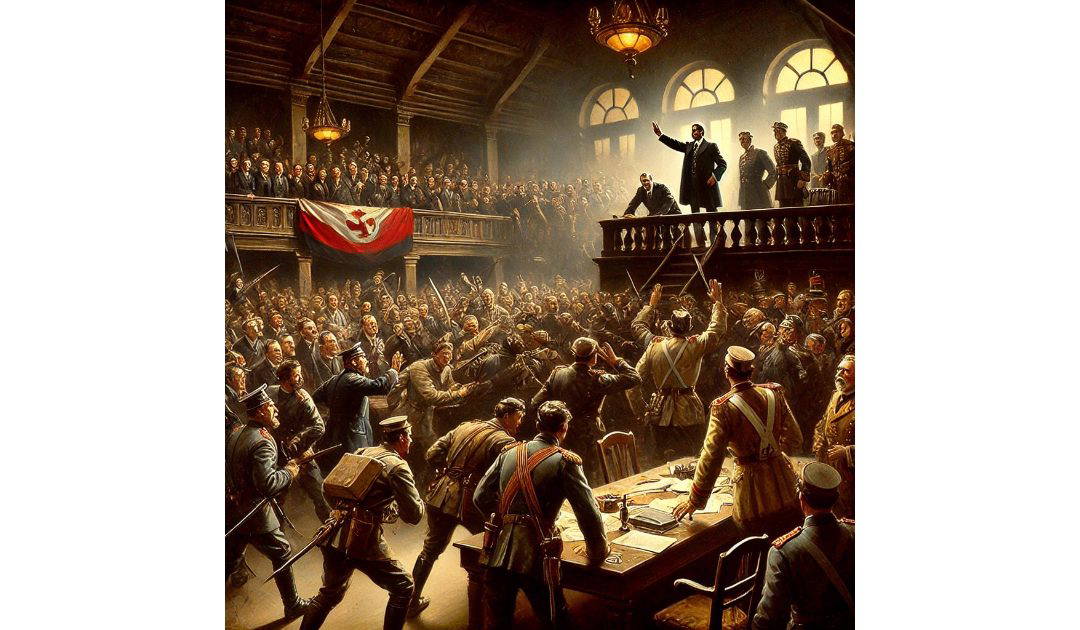On the 26th of February 1924 the trial of Adolf Hitler, for treason after the Beer Hall Putsch, began in Munich. The Beer Hall Putsch, also known as the Munich Putsch, was a failed coup attempt by Adolf Hitler and the Nazi Party (NSDAP) to overthrow the German government on the 8th of November, 1923. It took place in Munich, Bavaria, and was inspired by Benito Mussolini’s successful March on Rome in 1922. However, the putsch collapsed within 24 hours, resulting in Hitler’s imprisonment and a shift in Nazi strategy toward gaining power through legal means.
In the early 1920s, Germany was in turmoil due to the aftermath of World War I and the harsh terms of the Treaty of Versailles (1919). The Weimar Republic, Germany’s democratic government, faced economic collapse, hyperinflation, political extremism, and widespread discontent. Many Germans, especially right-wing nationalists, viewed the government as weak and blamed it for national humiliation.
In Bavaria, the local government was more conservative and opposed to the Weimar Republic. Hitler, the leader of the small but growing Nazi Party, saw an opportunity to seize power by exploiting nationalist sentiment and forming alliances with other right-wing factions.
On the 8th of November, 1923, Hitler and his followers stormed the Bürgerbräukeller, a beer hall in Munich where Bavarian leaders, including Gustav von Kahr, were addressing an audience. Hitler, armed and backed by Ernst Röhm and the Nazi paramilitary force, the SA (Sturmabteilung), declared a “national revolution” and tried to force Kahr and other officials to support his coup.
Initially, Kahr appeared to comply, but later that night, he and his fellow officials withdrew their support and alerted the government. The following morning, on the 9th of November, Hitler and his supporters, including General Erich Ludendorff, attempted to march through Munich to seize control.
However, as they advanced toward the city centre, they were met by Bavarian police near the Feldherrnhalle. A brief but deadly clash ensued, resulting in the deaths of 16 Nazis and four policemen. Hitler was injured and fled, but he was soon arrested on the 11th of November, 1923.
The Beer Hall Putsch was an embarrassing failure, but it ultimately worked in Hitler’s favour in the long term. Hitler used his trial in 1924 as a platform to promote Nazi ideology. He gave passionate speeches blaming the Weimar Republic and the Treaty of Versailles for Germany’s suffering. His words gained nationwide attention, making him a well-known figure. Instead of being executed for treason, Hitler was sentenced to five years in Landsberg Prison, but he served only nine months. While in prison, Hitler wrote Mein Kampf (My Struggle), outlining his political ideology and future plans. Hitler realised that armed revolution was not the way to power. Instead, he decided to take control legally, using propaganda, elections, and mass rallies to gain influence.
By 1933, less than a decade later, Hitler had achieved what he failed to do in 1923. He legally became Chancellor of Germany, leading to the Nazi dictatorship. The Beer Hall Putsch, though a failure, was a crucial turning point in Hitler’s rise to power.

